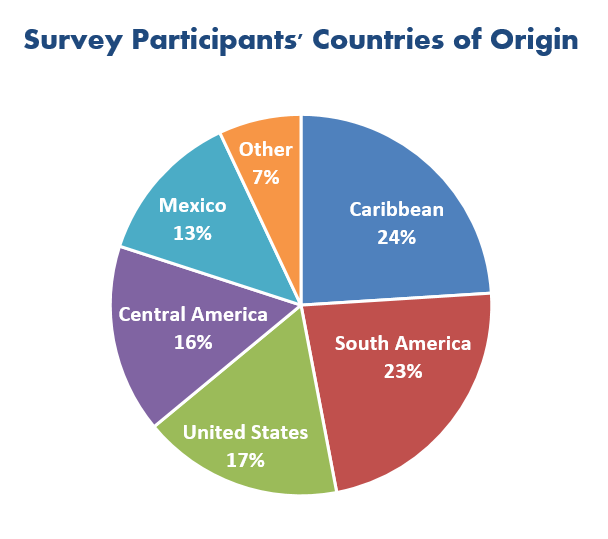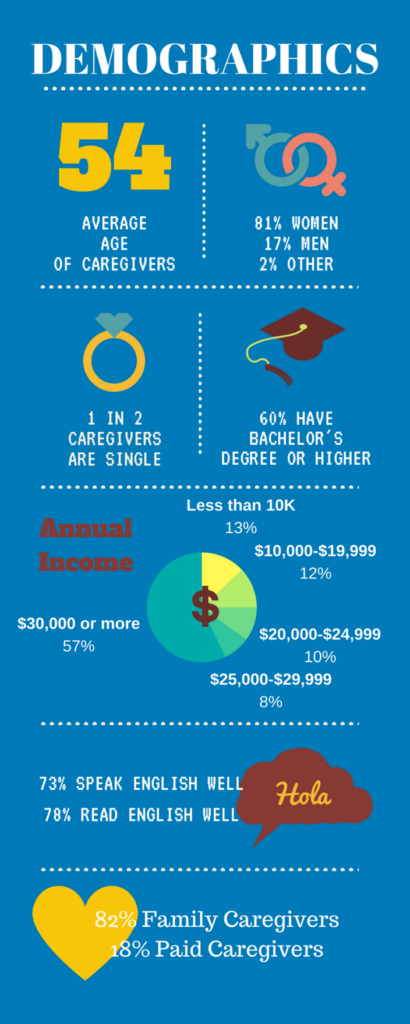Family has always been at the heart of Hispanic values. A big part of that value includes caring for our elders. In fact, providing care for our elders is often considered an honor and is performed willingly. However, caregiving does not come without its own challenges.
As life expectancies grow, we are faced with concerns about health (e.g., chronic disease, dementia, etc.), health care costs, financial stability, and housing. Many of these issues have Hispanic families turning to each other even more for physical, emotional and financial support.
This year, the National Hispanic Council on Aging (NHCOA), along with its partners, has focused on the needs of Hispanic family caregivers. Over the course of the past year, among other things, NHCOA implemented a National Caregiving Survey. The Hispanic older adults and caregivers that participated in this survey and our other events were enthusiastic about working to support caregivers and were dedicated to addressing the burdens of caregiving for Latino caregivers.
The challenges faced by Hispanic caregivers may seem daunting, but the dedication of community leaders, Hispanic focused nonprofit organizations, decision makers and experts working together can find solutions to the challenges and ease the burdens of caregiving for Hispanic caregivers. Here we share the results of the National Caregiving Survey.

NHCOA’s National Caregivers Survey was administered in Spanish and English and could be taken online or in-person at various NHCOA events. Many local community-based organizations and community leaders were instrumental in disseminating this survey to survey takers. The target audience was Latino caregivers. Survey participation was voluntary and anonymous. The goal of the 2017 survey was to:
- Understand the demographics of Latino caregivers,
- Describe the challenges caregivers face, and
- Recognize what resources are needed to aid caregivers in their roles.
Over 7 months (March – September), NHCOA surveyed 158 Hispanic caregivers. Eighty-nine (89) participants took the survey in English and sixty-nine (69) participants took the survey in Spanish. One-in-four (25%) caregivers were age 65 and older, with an average age of 54. The age range of survey takers ranged from 26 years old to 82 years old.
The vast majority of caregivers were employed (64%) and had incomes greater than $30,000 (57%). More than 80% of Hispanic caregivers provided care for a friend or family member:
- Parent/Parent-in-law (50%),
- Spouse/Partner (13%),
- Child (12%),
- Friend/Neighbor (8%), and
- Other (31%).*
*Note the percentages do not total 100% as caregivers could select multiple categories.
Survey respondents lived in 19 states, Puerto Rico and Washington, D.C. Most respondents live in Maryland (30%), California (16%) and Florida (15%), the sites of this year’s regional conferences. Eighteen countries/territories of origin were represented by caregivers who took the survey, with most having been born in the United States (17%), Puerto Rico (13%), Mexico (13%), and El Salvador (11%).
Half of caregivers live with the ones they are caring for and more than half (52%) of caregivers have been providing care for more than 5 years. Additionally, when we asked about the amount of time spent on caregiving, we found that 29% of caregivers spent less than 8 hours a week on caregiving, 22% spent 9-20 hours a week, 15% spent 21-30 hours a week, 11% spent 31-40 hours a week on, and 23% spent more than 40 hours a week on caregiving tasks.

Caregivers provide a range of services and assistance for those they are caring for. To better understand the types of assistance that Latino caregivers currently provide to their loved ones, we asked “What kind of assistance do you provide?” Caregivers were able to select multiple services. Most caregivers tended to provide everyday assistance such as meal prep, assisting with medical visits, transportation, household chores, administering medication, etc.
Caregivers provide care to individuals with a variety of conditions including advanced age, dementia, and cancer. This experience can be a chronic stressor, and caregivers often experience detrimental psychological, behavioral, and physiological effects on their daily lives and health. Latino caregivers overwhelmingly reported (71%) that caregiving is taking an emotional toll on them.
Latino caregivers were asked to list their top three challenges they have experienced as a caregiver. Most caregivers (64%) reported that balancing other family and personal responsibilities was among their top three challenges as caregivers. The least reported challenge (44%) was communicating with health care providers. Other challenges included finding information and educational resources for caregivers (47%), having enough money to afford caregiving (48%), and understanding government programs such as Medicare, Medicaid, SSI, SNAP, etc. (56%). We also asked caregivers about their changes in employment status due to their caregiving roles and found that slightly more than half (51%) had no change in jobs status. The major change reported was a decrease in hours, however, only 13% reported that change. This year NHCOA is working on a strategy to support caregivers in their roles. To that end, we asked what Spanish language resources caregivers would like to have. Caregivers were able to choose multiple options and overwhelmingly caregivers wanted to see assistance with government programs in Spanish (57%) and trainings on stress management (56%). Another major concerns among Latino caregivers is that many are untrained, and half of caregivers wanted to receive trainings on caregiving techniques in Spanish.
The opinions expressed in this article are those of the author and do not necessarily reflect those of the Diverse Elders Coalition.

